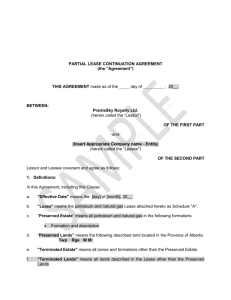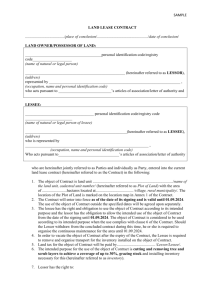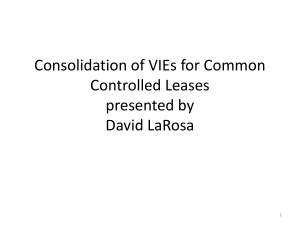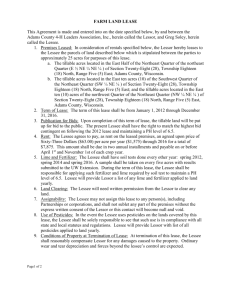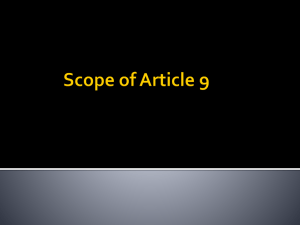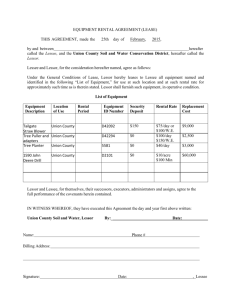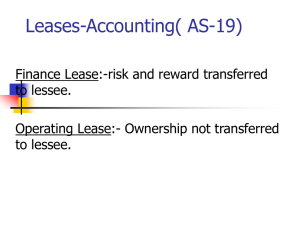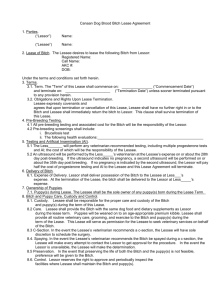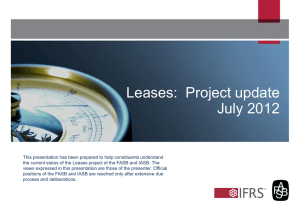Formation of the Contract of Lease
advertisement
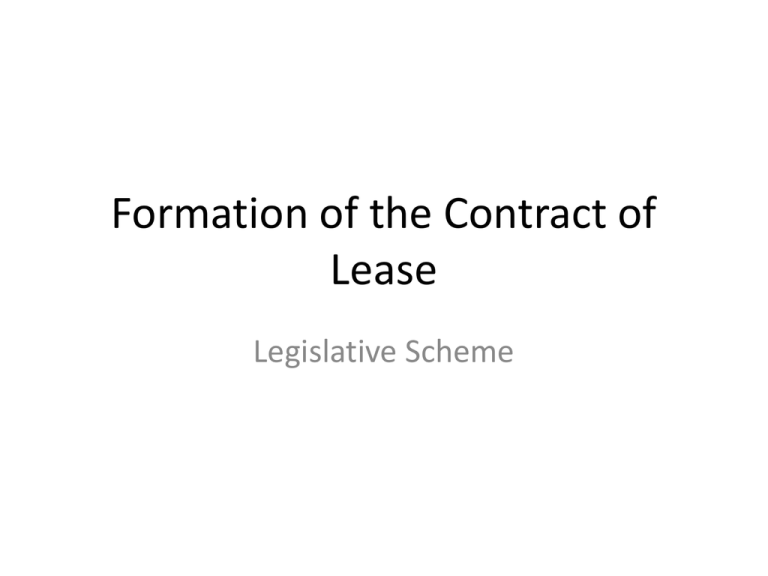
Formation of the Contract of Lease Legislative Scheme Rental Housing Act 50 of 1999 [RHA] • To give effect to the right to adequate housing in terms of s 26 of the Constitution. • Rental Housing Tribunals to deal with complains concerning unfair practice. • It applicable to residential leases. Legislative Framework • CPA & RHA where applicable impacts significantly on the common law lease. • CPA applies both to residential & commercial leases. Definition • A lease is a reciprocal agreement in terms of which the lessor undertakes to confer upon the lessee, the temporary use & enjoyment of a particular thing (res) in exchange of counterperformance. Gen Requirement for Conclusion of the Lease • CPA – s8 protects consumers against discriminatory marketing & provides that a lessor mayn’t unfairly discriminate against prospective lessee on grounds listed in s 9 of the Constitution. S29 of CPA Consumer’s right to fair & responsible marketing: S 40 unconscionable conduct of the part of the lessor • Lease agreement vitiated by unconscionable conduct will be void. Formalities • S 5 of RHA confirms principle that leas agreement need not be in writing. Essentialia of the Contract of Lease 1. Leased property 2. Use and enjoyment of such property 3. Nature & extent of counter performance delivered. Incidentalia of the contract of lease • S 49 of the CPA places additional duties on a lessor at the time of formation of contract of leas where certain terms are included. Unfair unreasonable or unjust contract terms • S48 prohibits lessor from including in an agreement terms that unfair ... Notice required for certain terms & conditions – s49 a) Limits the risk or liability of the lessor b) Constitute assumption of risk or liability by the lessee c) Imposed obligation on the lessee to indemnify the lessor d) Constitute an acknowledgement of any fact by the lessee. Powers of court to ensure fair & just conduct, terms & conditions • S 52 Court empowered to maker various orders. The common law duties of the lessor 1. Delivery of the leased property • She must put lessee in use & occupation. • In terms of s 54 of CPA is the right of the consumer to demand quality service The common law duties of the lessor 2. Maintenance of the leased property • Lessor is not obliged to repair damage caused by the lessee. Lessee’s Remedies • Specific performance, rescission and damages • Further remedies: reduction of rent, & undertaking the repairs herself & recovering the cost from the lessor. Arnold v Viljoen 1954 3 SA 322 (C) • Test for tenant’s liability for rent is whether he was in occupation of the premises “and whether such occupation was beneficial or not” Steynberg v Kruger 1981 3 SA 473 (O) • Dispute fitness of leased property, maintenance of property in such suitable state & whether lessee is entitled to reduction of rent where the lessor had been in breach. Steynberg v Kruger 1981 3 SA 473 (O) • Court didn’t approved of decision in Arnold & refused to grant summary judgement against K for his failure to pay rent in the above circumstances. • See also Thompson v Scholtz [1998] 4 All SA 526 (SCA) The common law duties of the lessor 3. Providing undisturbed use and enjoyment • Lessor himself mayn’t disturb the lessee’ use & enjoyment; & • Has to guarantee that no third party with a better title will disturb the lessee in his use & enjoyment. Disturbance by Lessor • Lessee’s entitled to contractual remedies for breach: specific performance, rescission and/or a claim for damages. Specific can effect in two ways: 1. Prohibitive interdict 2. Spoliation order – an order which obliges lessor to restore the lessee to his occupation. 3. Under certain circumstances, she is entitled to a reduction in the rent. Disturbance by third parties • Lessee can put up vigorous defence if the third party claim appears to be indisputable. • He is entitled to claim damages from the lessor The common law duties of the lessee 1. She is entitled to payment of the rent by the lessee • Lessee falls into arrears with his rent, landlord acquires hypothec over all movable situated on the property. Assets on leased premises but belonging to third parties subject to hypothec a) Lessor is unaware of the fact that the assets don’t belong to the lessee b) Impression is created that assets belong to the lessee. c) Assets where brought onto the premises with the intention to hold them permanently. d)Assets brought onto premises use by the lessee. Proper use of the property • Lessee is obliged to use the leased property as a reasonable person would use & care for his own property. Remedies • Damage or alterations made without lessor’s approval, specific performance in the form of interdict. • Material breach, lessor may cancel the lease Return of the property on termination of lease • Lessor’s Remedies • Onus of proving damage to the property wasn’t caused by the lessee’s action rests on the lessee. Lessor’s Remedies • Lessor’s right to evict lessee may be impaired by s26(3) of the Constitution • Prevention of Illegal Eviction & Unlawful Occupation of Land Act 19 of 1998 • Land Reform (Labour Tenants) Act 3 of 1996 • Extension of Security of Tenure Act 62 of 1997 Glen Elgin Trust v Titus [2001] 2 All SA 86 (LCC) • Held Constitution was to lease agreements & that a court, before ordering that a lessee be evicted, has to adhere to s26(3) Rights and Duties Imposed by RHA 50 of 1999 • S 5(4) makes it clear that neither lessee nor lessor may waive any of the provisions. Sundry Aspects of Law of Lease • Sub-letting, cession and assignment Sub-lease • Like the original lease, a sub-lease is a reciprocal agreement in terms of which one party the sub-lessor, undertakes to confer upon another party, the sub-lessee, the temporary use & enjoyment of the thing in exchange for counter-performance. Spies v Lombard 1950 3 SA 469 (A) Sublease could possibly be to the lessor’s detriment because the sub lessee: • Could fail to make proper use of the property; or • Be in breach of other contractual duties. Cession • Where the lessee (the cedent) transfers his rights against the lessor to a third party (the cessionary). • The original lessee then falls away as creditor since the cessionary steps into her shoes. Delegation & Assignment • Delegation requires the consent of the original debtor, the creditor & the new debtor. • When both rights & obligations are transferred, assignment occurred. • A second lease is not formed, but the third party takes over the rights & obligations of the original lessee Huur gaat voor koop – hire takes precedence over sale
